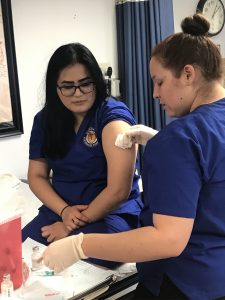Becoming a Medical Assistant is one of the quickest ways to enter the world of healthcare. If you are looking to get a good job fast in a growing field, becoming an MA is the way to go. But after you have completed your program and are working in the position, then what? What is the career advancement options for a Medical Assistant?
Medical Assistants can Choose from Several Specializations
Healthcare is a field with tons of specializations, and Medical Assistants are no exception. Finding an MA specialization is one of the best ways to make yourself more in-demand. It also means finding a field that truly interests you and that you enjoy working in. An MA can specialize in everything from internal medicine to transplant surgery and oncology. It would be impossible to name all their options, but every branch and level of medicine must have specialized experts carrying out daily administrative and clinical tasks. Your choices for a specialization are as vast as healthcare itself!
You will Have a Leg up on Further Medical Education
If you want to become a nurse, the education and experience you will get as a Medical Assistant will make a difference in your training. You will probably find clinical and coursework more manageable than other students who go in without experience. Much (though not all) of the material you will encounter will look familiar. As a veteran of the medical world, you will probably be much more at ease with the technical and professional aspects of the material, as well as building upon your existing knowledge base. While other students are learning the ropes of the world of healthcare, you will be climbing them. After all, you have been here before.
Medical Assistants get Valuable Real-World Experience
No matter what you choose to do after your first MA job, you will always have experience that makes you more dynamic and interesting as both an employee and a person. If you want to become a nurse, your MA experience will serve you well. If you want to enter another field, potential employers will almost certainly think highly of your MA experience. And, of course, there is always the option of being an MA for the long haul. After all, Medical Assistants are in demand and an integral part of our healthcare system.
Are you thinking about a new career as a medical assistant? In order to protect our community during the COVID-19 crisis, The Allen School of Health Sciences is offering virtual campus tours for enrollment for our classes starting soon. Contact the Allen School today! We cannot wait for you to become part of the Allen School family. Visit www.allenschool.edu to learn more.

 A Few helpful tips to improve your Medical Assistant skills
For students in a Medical Assistant program you may be busy learning about the clinical aspects of the job, such as how to draw blood, administer an injection, or take a patient’s vital signs. These are clearly a very important part of your training. But in addition, there are also “soft skills” that are important to your training. Learning to be a reliable employee is a skill that can use throughout your entire career. Try these tips for getting a strong start in your new career.
A Few helpful tips to improve your Medical Assistant skills
For students in a Medical Assistant program you may be busy learning about the clinical aspects of the job, such as how to draw blood, administer an injection, or take a patient’s vital signs. These are clearly a very important part of your training. But in addition, there are also “soft skills” that are important to your training. Learning to be a reliable employee is a skill that can use throughout your entire career. Try these tips for getting a strong start in your new career.